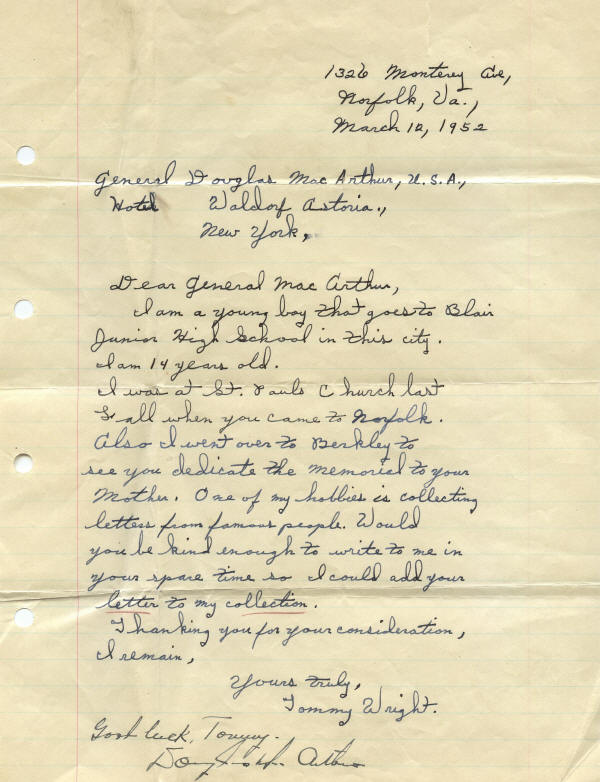529204
Douglas MacArthur
Scroll down to see images of the item below the description
Douglas MacArthur, 1880-1964. General of the Army. Autograph note signed, “Good luck, Tommy. / Douglas MacArthur,” at the conclusion of a boy's letter to him. No place [New York City, New York], no date [March 1952]. With original envelope.
This letter is part of a collection assembled by Rosemary E. Wright (1890-1969), who spent some 35 years working for the Army, ultimately as Chief of the Army General Staff Assignment Section, before she retired in November 1953. Miss Wright handled all of the administrative work relating to officers assigned to the General Staff. She knew all of them—well enough to call Dwight D. Eisenhower “Ike,” George S. Patton, Jr., “Georgie,” and Jonathan Wainwright “Skinny." During her time with the Army, she assembled a large collection of signed photographs and letters from Army generals and others. She wrote of her years with the Army in The Generals Call Me “Mom,” which appeared in the March 15, 1952, edition of Collier's magazine.
Miss Wright's son, Tommy, also sought autographs by writing to various people to ask them for letters for his collection. This is one of his letters, written three days before his mother's article appeared in Collier's. Writing on notebook paper, the 14-year-old tells MacArthur, “I was at Falls Church last Fall when you came to Norfolk. Also I went over to Berkley to see you dedicate the memorial to your Mother." He then asks for MacArthur's autograph: “One of my hobbies is collecting letters from famous people. Would you be kind enough to write to me in your spare time so I could add your letter to my collection[?]" MacArthur responds by penning a note at the conclusion of Tommy's letter: “Good luck, Tommy. / Douglas MacArthur." MacArthur's original mailing envelope, marked “Official Business,” bears MacArthur's typewritten address in New York City.
MacArthur was one of the most popular and accomplished American military leaders of the 20th Century. He was flamboyant and confident, to the point of being arrogant and egotistical, but he was a genius as a military tactician.
MacArthur graduated first in his class at West Point in 1903 after compiling the highest scholastic average at the academy in 25 years. As a brigadier general, he was the youngest divisional commander in France during World War I. He was decorated 13 times and cited seven additional times for bravery.
He returned to the United States to become the youngest superintendent in the history of West Point. After a stint in the Philippines, MacArthur was promoted to temporary general and became Army Chief of Staff. He returned to the Philippines as a military advisor before retiring from the Army in 1937.
President Franklin D. Roosevelt recalled MacArthur to service in June 1941 when negotiations with the Japanese government broke down. After the Japanese attack on Pearl Harbor on December 7, 1941, MacArthur commanded the defense of the Philippines until Roosevelt ordered him to Australia to become Supreme Commander of the Southwest Pacific Area. It was then that MacArthur vowed, “I shall return." From Australia he launched the New Guinea campaign and later directed the campaigns that led to the liberation of the Philippines. In December 1944, he was promoted to the new five-star rank of General of the Army. He accepted the surrender of Japan on the U.S.S. Missouri on September 2, 1945, and served as military governor of Japan.
When the Korean War began in June 1950, MacArthur became commander of U.N. military forces in South Korea while retaining his command of Allied forces in Japan. After driving the North Korean forces back over the 38th parallel, MacArthur obtained President Harry S. Truman's permission to press into North Korea and advance all the way to the Yalu River, the border between North Korea and Communist China. When China intervened, throwing the U.N. forces back in disarray, MacArthur wanted to bomb Chinese bases in Manchuria. Truman, who did not want to provoke World War III, refused. When MacArthur openly criticized the administration and urged action contrary to its policies, Truman, who viewed MacArthur's comments as “Rank insubordination,” relieved him from command. The public was outraged, and there were calls for Truman's impeachment.
MacArthur received a hero's welcome when he returned to the United States. Addressing a joint session of Congress, he talked of an old military song with the line, “Old soldiers never die; they just fade away." “And like the old soldier in that ballad,” he said, ”I now close my military career and just fade away, an old soldier who tried to do his duty as God gave him the sight to see that duty." Congress later held hearings over MacArthur's firing, but in the end senior military officers vindicated Truman's insistence that, as the constitution provides, the civilian government maintain control over the military.
MacArthur unsuccessfully sought the presidential nomination in 1952. He retired from active service and became an officer of a large business corporation. He died in 1964.
This letter has mailing folds and a few scattered wrinkles, but overall it is in fine condition. MacArthur's note and signature are in excellent condition. The envelope is torn from being opened, and it has been taped in the upper right corner. It is in very good condition.
Unframed.

